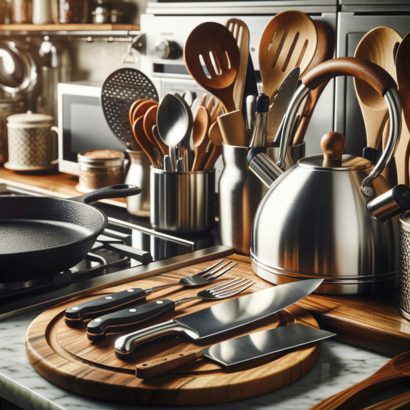Kitchen equipment, ranging from high-tech appliances to basic utensils, plays a crucial role in the functionality and efficiency of our cooking spaces. However, the longevity and performance of these tools largely depend on how well we maintain them. In this article, we delve into the world of preventative care for kitchen equipment Dubai, exploring practical ways to preserve and extend the life of these essential items.
Understanding the Importance of Regular Maintenance
Regular maintenance of kitchen equipment cannot be overstated. Just like a car needs regular servicing to run smoothly, kitchen appliances and tools require consistent care to function at their best. This routine maintenance not only ensures that your equipment operates efficiently but also helps in identifying potential problems before they become major issues. Regular cleaning, proper storage, and timely repairs are integral to maintaining the quality and longevity of your kitchen gear.
Cleaning: The First Step in Preventive Care
Cleaning is the most basic yet essential aspect of preventative care. Whether it’s a high-end food processor or a simple wooden spoon, keeping your equipment clean is the first step in preservation. This means not only washing after each use but also ensuring that they are dried properly to prevent rust and mold growth. For electrical appliances, it’s important to follow the manufacturer’s instructions for cleaning to avoid damaging sensitive components.
The Role of Proper Storage
Storing your kitchen equipment correctly is as important as cleaning them. Sharp tools like knives should be stored in a knife block or on a magnetic strip to maintain their edge. Pots and pans should be stacked with care, preferably with liners between them to prevent scratching. For appliances, ensure they are stored in a dry, cool place and are properly covered to protect from dust and moisture.
Regular Inspections and Timely Repairs
Regular inspections can help catch issues early, preventing costly repairs down the line. Check for loose handles, malfunctioning parts, or any signs of wear and tear. If you find any issues, it’s important to address them promptly. Sometimes, a simple tightening of a screw or a minor adjustment can save you from having to replace an entire appliance.
The Significance of Using Equipment as Intended
Using kitchen equipment as intended by the manufacturer is key to its preservation. Misuse can lead to damage and shorten the lifespan of the item. Always read and follow the user manual, especially for complex appliances. Avoid using utensils for purposes other than what they were designed for, like using a knife as a can opener, which can damage its edge.
Investing in Quality Equipment
Investing in quality kitchen equipment can make a significant difference in its longevity. High-quality items are often designed to withstand regular use and are made from materials that are more durable. While the initial cost may be higher, quality equipment usually pays off in the long run through longer service life and better performance.
The Impact of Environmental Factors
Environmental factors such as humidity, temperature, and exposure to sunlight can affect the condition of your kitchen equipment. Appliances and tools should be kept in an environment that is conducive to their preservation. For example, wooden utensils and cutting boards should be kept away from extreme moisture to prevent warping and cracking.
Professional Maintenance for High-End Appliances
For high-end or specialized kitchen appliances, professional maintenance may be necessary. This is particularly true for items like refrigerators, ovens, and dishwashers. These appliances have intricate parts and systems that might require the expertise of a professional for maintenance and repairs.
Training and Awareness
Educating yourself and others who use the kitchen about the proper use and care of equipment is crucial. Mishandling and ignorance are common causes of damage. Simple measures, such as using the correct utensils for non-stick pans or avoiding overloading blenders, can significantly extend the life of these items.
The Benefits of Preventative Care
Preventative care of kitchen equipment has numerous benefits. It ensures that your tools and appliances perform efficiently, maintains their appearance, and extends their usable life. It also saves money in the long run by reducing the need for frequent replacements or expensive repairs.
Embracing Eco-Friendly Cleaning Practices
In the pursuit of preserving kitchen equipment, it’s also essential to consider the impact of cleaning agents. Harsh chemicals can be detrimental to both your equipment and the environment. Opting for eco-friendly and gentle cleaning solutions can prevent damage to the surface and components of your kitchen tools. For instance, baking soda and vinegar can work wonders in cleaning without the harshness of chemical cleaners. It’s a sustainable choice that is kind to both your equipment and the planet.
Understanding the Material Specifics
Different materials require different care. Stainless steel, cast iron, copper, and non-stick surfaces each have unique maintenance requirements. For example, cast iron skillets should be seasoned regularly to maintain their non-stick properties and prevent rust. Non-stick pans, on the other hand, should not be overheated and require the use of non-metallic utensils to avoid scratching the surface. Being aware of these material specifics can significantly extend the life of your kitchenware.
The Importance of Periodic Upgrades
While maintaining and preserving your kitchen equipment is crucial, it’s also important to recognize when it’s time for an upgrade. Technology in kitchen appliances is constantly evolving, offering more energy-efficient and effective solutions. Periodically assessing your equipment and considering upgrades can not only improve your cooking experience but also contribute to energy savings in the long run.
Balancing Use and Maintenance
It’s about finding a balance between using your kitchen equipment to its fullest potential and maintaining it to ensure it lasts. Regular use can actually prevent certain issues; for instance, running your dishwasher regularly can prevent seals from drying out. Similarly, using your oven frequently can ward off rust and keep the components functioning well.
Conclusion
The key to preserving your kitchen equipment lies in regular maintenance, proper use, and a bit of investment in quality. By adopting these preventative measures, you not only enhance the functionality of your kitchen but also contribute to sustainable living by reducing waste.


